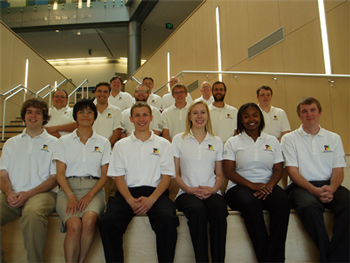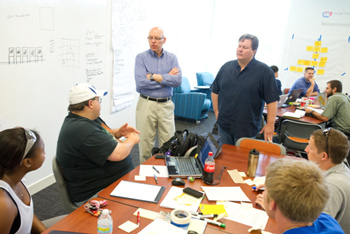In May 2012, USI piloted the first five-week Technology Commercialization Academy (TCA). The teams were made up of six engineering students and six business students who worked full- time to develop ideas and strategies using three of Naval Surface Warfare Center Crane Division (NSWC Crane) patents. This year’s participants were:
 Business:
Business:
Engineering:
Three teams were formed based on creative problem solving preferences in addition to discipline. The teams conducted ideation exercises tied to megatrends, preliminary market research and feasibility analysis, business modeling, and developed prototypes as well as three year financial pro formas. Utilizing USI and community resources and Crane technologies the student teams created prototypes for the following:
 Two USI College of Business faculty designed and implemented the unique accelerated commercialization process: Dr. Kevin Celuch, Blair Chair of Business Science and Professor of Marketing, and Mr. Bryan Bourdeau, Instructor in Business. Based primarily on their work in developing the College of Business Entrepreneurship minor, which is based on assumption identification and testing through immersive learning, the academy was designed to facilitate rapid learning. According to Celuch, “The experience was designed to prepare students for a future characterized by change. We wanted to prepare students for where business thinking has to move to, not where it currently is.”
Two USI College of Business faculty designed and implemented the unique accelerated commercialization process: Dr. Kevin Celuch, Blair Chair of Business Science and Professor of Marketing, and Mr. Bryan Bourdeau, Instructor in Business. Based primarily on their work in developing the College of Business Entrepreneurship minor, which is based on assumption identification and testing through immersive learning, the academy was designed to facilitate rapid learning. According to Celuch, “The experience was designed to prepare students for a future characterized by change. We wanted to prepare students for where business thinking has to move to, not where it currently is.”
"The process utilized in the TCA produced hundreds of ideas, narrowed to thirty-six, further narrowed to twelve, finally converging to three unique ideas. The students pushed hard and demonstrated the process works to produce feasible ideas in a very expeditious time frame", said Bourdeau.
On June 5, the teams traveled to NSWC Crane to make presentations to officials there, including some of the original inventors. The students made final presentations on June 8 in the Business and Engineering Center atrium before an audience of USI faculty and staff, potential financial investors, and area business and community leaders, including Debbie Dewey, Growth Alliance for Greater Evansville (GAGE) executive director, and Brian Wilson, IT Manager for Escalade Sports.
The students particularly enjoyed working in interdisciplinary teams. Student feedback was overwhelmingly positive with every student recommending the experience to others and some indicating that they would like to continue with the program or that they would do it again.
The local community could benefit directly from the real-life application of the patents. The group that worked on the ‘pressurization mat’ met with staff and administration from Deaconess Hospital, including President Linda White. The software management package is a system that could be implemented at the University of Southern Indiana.